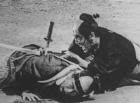
Imai's Adauchi (AKA Revenge) is surely one of the best samurai films to come out of Toei, (a prolific company that didn't seem to mind if it's product devolved into mediocrity) and maybe one of the best period. Toei has done much less to impress me than the other major studios of the 50s and 60s, yet they did give many amazing directors shots at high gloss period pieces, including the somewhat maligned Imai Tadashi, which accounts for some very interesting work. The direction in this film is beautiful, and I have a feeling that if the presentation was correct I would be praising it more highly (I believe the film was presented at around 1:90 AR on the video I viewed, in black and white, while it was intended, according to JMDB to be color cinemascope, or 2:35, a huge difference.) The flow and rhythm of the film is striking for a samurai picture. Imai holds on moments for what seems like forever (it's amazing how long ten seconds can feel when everything is motionless), and it creates a startling effect. It's unfortunate that the film's only weak link is it's Toei stable of actors: Tanba is hollow and useless bluster in a supporting role and Nakamura Kinnosuke pathetically attemps some sort of realistic acting as the unfortunate Ezaki Shinpei, a samurai and second son, who's pride and class resentment begin a series of events that lead to death. The plot is predictable to a point, but certainly has some surprises.
One of the fascinating things about the film was it's political and anti-feudal aspect. It showed everyone in power to be conceited and hypocritical, abusing the Bushido code for their own purposes, and ignoring it when they see fit. It's worth it to note that Imai's previous film period, Cruel Story of Bushido, also lambastes the feudal ethos. The main character, Ezoki Shinpei, feels compelled to give up everything he wants to maintain his honor. His alternating bluster and sacrifice come out of confusion and desperation, only leading to ruin for himself, his family, and the adversary's family as well. This belongs amongst the ranks of Kobayashi's Seppuku, Tanaka's The Betrayal, and Yamamoto's Tengu-to as films that rate Bushido and the samurai way as completely useless at best, but closer to evil incarnate.
I mentioned above that Imai is often maligned. I first heard of Imai through Anderson and Richie's The Japanese Film, where he was almost as lambasted as Yamamoto Satsuo for being a left wing propagandist (sure his Kome, AKA Rice, comes to mind, as it's basically a remake of Uchida's social realist film Earth, from 1939). But times have changed. There's no longer a cold war, and the old prejudices that seemed so important against far left ideologies now seem quaint. Frankly, the more I see of either director the less I can account for propaganda, and the more I see extremely pleasant qualities of fine filmmaking. I look forward to seeing as much of this director's work as I can find.
I bought this film from Kurotokagi.com, and the image quality left a bit to be desired (it seems that it's taped off of television, among the previous issues), but was still a fine product considering there aren't any other resources for this available (hopefully a DVD will be released soon.)
edit: this movie is meant for 2:35 black and white, not color.
No comments:
Post a Comment